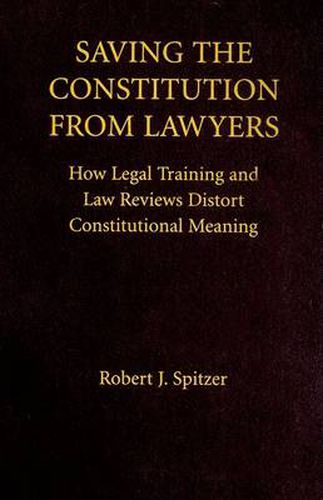Readings Newsletter
Become a Readings Member to make your shopping experience even easier.
Sign in or sign up for free!
You’re not far away from qualifying for FREE standard shipping within Australia
You’ve qualified for FREE standard shipping within Australia
The cart is loading…






This book is a sweeping indictment of the legal profession in the realm of constitutional interpretation. The adversarial, advocacy-based American legal system is well suited to American justice, in which one-sided arguments collide to produce a just outcome. But when applied to constitutional theorizing, the result is selective analysis, overheated rhetoric, distorted facts, and overstated conclusions. Such wayward theorizing finds its way into print in the nation’s over 600 law journals - professional publications run by law students, not faculty or other professionals - and peer review is almost never used to evaluate worthiness. The consequences of this system are examined through three timely cases: the presidential veto, the ‘unitary theory’ of the president’s commander-in-chief power, and the Second Amendment’s ‘right to bear arms’. In each case, law reviews were the breeding ground for defective theories that won false legitimacy and political currency. This book concludes with recommendations for reform.
$9.00 standard shipping within Australia
FREE standard shipping within Australia for orders over $100.00
Express & International shipping calculated at checkout
This book is a sweeping indictment of the legal profession in the realm of constitutional interpretation. The adversarial, advocacy-based American legal system is well suited to American justice, in which one-sided arguments collide to produce a just outcome. But when applied to constitutional theorizing, the result is selective analysis, overheated rhetoric, distorted facts, and overstated conclusions. Such wayward theorizing finds its way into print in the nation’s over 600 law journals - professional publications run by law students, not faculty or other professionals - and peer review is almost never used to evaluate worthiness. The consequences of this system are examined through three timely cases: the presidential veto, the ‘unitary theory’ of the president’s commander-in-chief power, and the Second Amendment’s ‘right to bear arms’. In each case, law reviews were the breeding ground for defective theories that won false legitimacy and political currency. This book concludes with recommendations for reform.